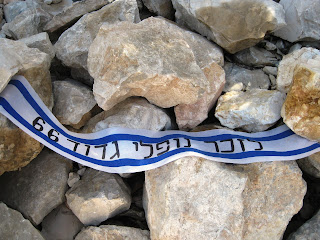Language fascinates.
History has strutted its hour upon the stage. Geography is more or less fixed, give or take a tectonic shift. Math and Science may be filled with undiscovered permutations -- but I would not call them living and breathing. Each of these studies is interesting. No doubt about it. But none of them is as vibrant and alive for me as is the study of language.
A language is a growing and changing thing. In order to get "bifnim ha-milim," inside the words (I'll have to ask my teacher if one can get away with that phrase in Hebrew), one needs to experience the language in its home soil, with its own personal background and environment surrounding it. To truly learn Hebrew, one has to walk the Land, learn its history, and hear the language as it is used by Israelis, young and old.
 |
| Why are burned-out and rusted vehicles -- the skeletons of war -- such effective reminders of our sense of loss and triumph? |
This fanciful lead-in is brought to you by a tiyul I took yesterday with my ulpan class.
Our teacher's approach was very organic and creative. I don't know what his training is -- haven't figured out how to ask that b'Ivrit -- but Avi Mermelstein is a natural teacher. When he teaches language through history, you feel like you are there, seeing, hearing, almost smelling the reality behind the words.
Avi started this particular lesson by taking three days to teach us a song. The song was "Givat HaTachmoshet." Wrapped in music only 1960s Israelis could think was appropriate, this beautiful lyric tells the story of the battle for Ammunition Hill, a battle which was very significant in the amazing and miraculous outcome of the Six Day War.
 |
| The lyrics of the song, in Hebrew and English, in an unusual display at the museum, which is dedicated to the 183 soldiers who sacrificed their lives to reclaim Jerusalem. |
 |
| "Because of the fences and mines, we left the medics behind, and ran without our senses to Ammunition Hill." |
 |
| "We went down into the trenches, into the pits and channels, and toward death in the tunnels of Ammunition Hill." |
During those three days, Fern and Yosef and I were led by Avi through not only the maze of the poetic Hebrew language, but through the warren that was the history of that battle. And warren it was. A deadly and narrow labyrinth, the Jordanian-designed trenches on Ammunition Hill were a nightmarish battleground for young men in their late teens and twenties to wend their way through toward eventual glory.
 |
| "At two, two-thirty [in the middle of the night] we came through the stony terrain to the fields of fire and mines of Ammunition Hill." |
However beautiful and poetic a language might be, it truly comes to life when you walk its footpaths.
 |
| The task of capturing the hill was given largely to the Israeli 3rd company of the 66th Battalion. Thirty-seven Israeli soldiers fell in the battle for Ammunition Hill. |
As the 43rd anniversary of that battle approaches, I look at my husband of 25 years. Had we grown up in Israel, he may very well have fought in that war, may have lost friends on that hill. Looking at him, hearing their words, and seeing the details of that fateful landscape, I can feel the confusion and pain, fear and fury and loss, of those young men. I can feel their somewhat mystified glory. My heart swells for those who are still alive, in pride at their accomplishments, and in shared sorrow for those they lost, "who remained twenty years old on Givat HaTachmoshet."
 |
| To hear the song and read a translation in English, click here, and select Song #2. |
 |
| Each tree was planted to represent one of the soldiers who gave his life during the Six Day War. |
 |
| "I don't know why I received a commendation, I simply wanted to get home safely." |
Thank you to my teachers and classmates for helping me through the last few months' worth of encounters with the amazing Hebrew language.
A special thank you to Ami Steinberger for developing this wonderful Ulpan La-Inyan program.
 |
| http://ulpan.com/ |
Glossary:
Tiyul: hike, field-trip, outing
Ulpan: intensive Hebrew-language course
Givat HaTachmoshet: Ammunition Hill, located in northern Jerusalem, the site of a pivotal battle which enabled Israeli forces to liberate the Old City.









6 comments:
BIG :)
בתוך המילים.
...and a special thank you to you, Ruti, for putting this out... and to Ulpan La-Inyan's all-star instructors, Avi and Caron.
תמשיכו לִצְמוֹח (to blossom)
"May we never give up what they died to regain..." Unfortunately Ruti that has already happened. The Israeli government allows Arab Moslems to control the Temple Mount, and East Jerusalem is nothing but Arabs as far as you can see. The real problem is the Israeli government. Until we regain control of the Israeli government, we can win all the battles we want, but we will continue to lose every war.
Ami: !תודה ואמן
Avraham: You're right: I should have used the important word "again." May we never again give up another piece of land for which they have died. And that requires strong leadership.
Ruti
Firstly, mazal-Tov on your 25th wedding anniversary. May you both celebrate many more anniversaries in good health and happiness.
We live in a very special country with countless Brachot.Our history and our total existence is from The Hand of HASHEM.
How fortunate for us that we are HOME! Am Yisrael Chai!
Miriam
As always, dear Miriam, you see the glass not as half-full, but as brimming over. Thank you for your brachot!
Post a Comment